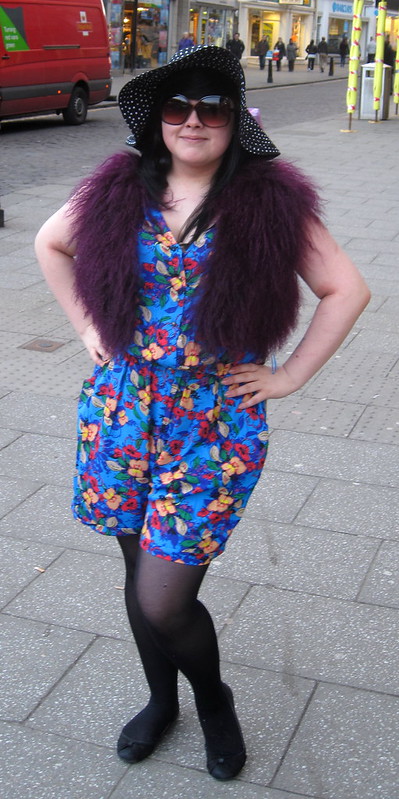Hark at the beauty queen, here. She swanned up and asked for her picture to be taken. Cheeky insouciance in a feather boa. This girl is my goose-bumped (it was March in Scotland – and, if you look at the people in the background, you see COATS. Despite the dry day, it was not really warm enough for that romper, but I think she’d just made it in Home Ec) patron saint: She Who Must Be Amused.
You’d be wise to read the whole piece yourself, but I can summarize: Rebecca Rabinowitz says fat kids are seldom seen as just themselves in literature, and consequently feel invisible. In our lit, as in our society, the fat = shameful conflation persists, largely because the shame bit is carried along by those of us who aren’t a projected “normal” size, and it’s got to stop. That’s a few of the ideas in the piece in a nutshell.
This is such a blind-spot topic – because it’s something that’s constantly there, but like racism in certain parts of the world, it’s something you drink in with the water from the time you’re a child, so it doesn’t seem abnormal. (We always wonder how the folks who have the segregated proms could do that – but if it’s normalized from when you’re a child… well…) Large folk are automatically either victim or bully or threat – never just themselves in a story. They’re the Problem Child, Issue of the Week, Lifetime Movie character you don’t want in your novel. Even when it seems like we’re trying to portray large people as sympathetic, it sometimes comes across as such an effort. In writing a character in A LA CARTE who was fat, but was vexed with her weight, and spent a somewhat inordinate amount of time worrying about it, I wanted to write about a girl who had a handle on her problems. She worked out when she was frustrated. And she ate when she was unhappy. True to life, yes; this character had a lot of insecurities and hang-ups – but I’m still sad that I didn’t know better and take the opportunity to subtly preach some acceptance. I should have handled that better. But, my own confession is I don’t handle the idea of “acceptance” as well – I truly thought (and it was gently inferred to me) that I should be “setting a healthy example.” Mental health, I guess, doesn’t count.
After reading an article quoting a 2006 interview with the CEO of Abercrombie & Fitch, and contrasting his “we don’t want fat people wearing our clothes” position with H&M’s subtly introduced size 14 swimsuit model, Rabonowitz’s words echoed in me again. They sounded even more loudly after discovering Militant Baker’s response to the idea that some brands aren’t for people over a size 10 (via Sorrywatch). When I see the cute, snub-nosed Militant Baker chickie with her curvy size-18 body assimilating the status-group norm for sexy bodies for her own transgressive use (Oh, how I love sociological vocabulary) it makes me laugh – but sigh a little, too. She shouldn’t have to make a point that a CEO should have already known.
Which leads me back to my patron saint. While I don’t at all consider her fat, plus-sized, or anything but a regular teen girl, I know that I also don’t see “normally.” She’d be on a plus-sized page, were she in a magazine. Well – so what if she is considered plus-sized. I think she’s adorable. Her smirk, her come-hither boa, her hands-on-hips, and in-your-face ‘tude. She’s everything she should be, and viva that verve.

Thank you for this post and the links. The kind of radiant confidence the young lady exudes is the kind I’ve only encountered in a few people. Regarding the whole “some clothes aren’t meant for people over a certain size,” I recommend the episode of Drop Dead Diva where Jane takes a clothing store to court (“The Dress” season 1/9).
As someone who has struggled with weight issues for more of her life than not, I feel like it’s a tottery hill upon which I attempt to balance. I’m trying to set healthy examples of attitudes for my daughter, but it feels like me against society (and sometimes family).
Fantastic photo & thought-provoking post.
It’s such a complex thing this girl is radiating–confidence, comfort with her own self. It makes me ask myself questions. Is that how she truly feels about herself? How did she get to be this person who throws so much confidence and flair into the world? Things like that. Because it’s the kind of thing that could use some spreading around.
Thanks for linking to those articles and bringing this up. I worry a lot about the messages we send to girls as they become women.